Cut Manotick Pest Damage: Welcome Beneficial Insects
Tired of pests ruining your garden? Get expert help restoring balance.
Request Your Free Quote Today!Quick Guide: Boosting Beneficial Bugs
- Identify common Manotick garden pests (aphids, grubs, etc.).
- Recognize helpful insects like ladybugs, lacewings, and ground beetles.
- Attract beneficials with specific flowers (dill, alyssum) and water sources.
- Provide overwintering shelter (leaf litter, uncut stems).
- Use Integrated Pest Management (IPM) for eco-friendly control.
Introduction: Pests Bugging Your Manotick Paradise? There's a Better Way!
Hello Manotick neighbours! Dreaming of a perfect backyard oasis, but finding aphids throwing a rave on your roses instead? Or maybe slugs are leaving slimy trails across your hostas like tiny, unwelcome graffiti artists? Ugh! Pests can really take the joy out of gardening and turn your beautiful landscaping efforts into a frustrating battle. We know folks in Greely, Osgoode, and right across the Ottawa area face these same garden invaders.
Before you declare war with harsh chemical sprays, let us introduce you to nature's undercover agents: beneficial insects! Yes, there are *good* bugs out there, ready and willing to patrol your garden, seeking out those pesky plant-munchers. Think of ladybugs as aphid-eating machines or ground beetles as slug hunters. Inviting these helpful critters is a fantastic, natural solution. It keeps your plants healthy, protects important pollinators like bees, and avoids introducing potentially harmful chemicals into your little slice of Manotick paradise. Let's explore how these tiny heroes can help you win the pest patrol!
Know Your Enemies: Common Garden Pests Plaguing Ottawa and Manotick Yards
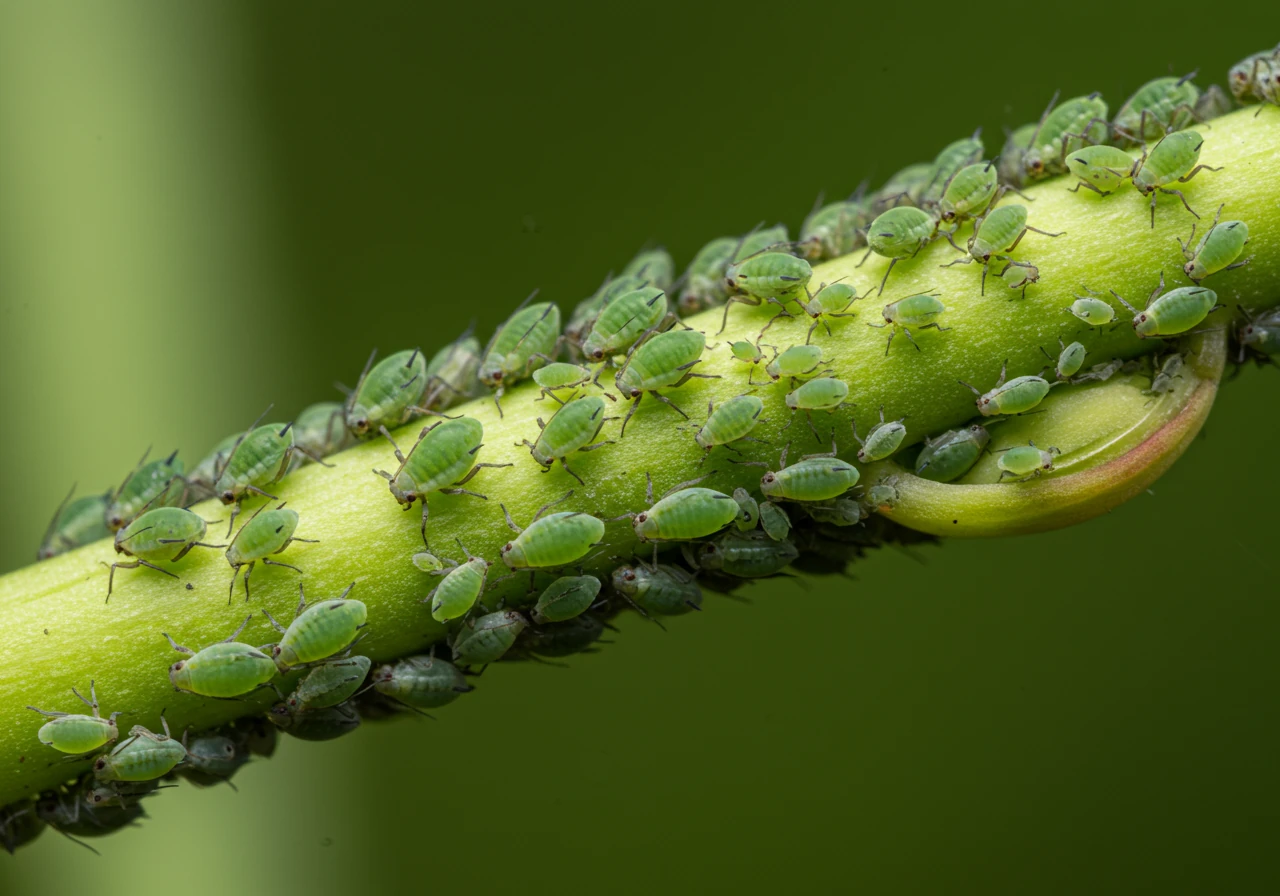
Alright, let's talk about the uninvited guests crashing your gardening party here in Ottawa, Manotick, and neighbouring areas like Greely and Osgoode. Knowing your enemy is half the battle, right? These critters can turn your landscaping dreams into a bit of a nightmare if left unchecked, especially with our unique climate shifts from hot summers to cold winters influencing their cycles.
Here are some of the usual suspects you might encounter in your yard:
- Grubs (like June Bug Larvae): These C-shaped critters live underground, munching happily on grass roots. If you see dead, spongy patches in your lawn that pull back easily like a loose carpet, grubs might be the culprits. They particularly enjoy lawns, sometimes taking advantage of areas with underlying soil or drainage issues. If you're battling heavy soil, understanding how to improve it can be beneficial; explore tips on managing Manotick rain garden clay soil drainage. Proper soil preparation is key for lawn health.
- Chinch Bugs: These are tiny terrors, especially during those hot, dry spells we get in the summer! They use their piercing mouthparts to suck the life out of grass blades, leaving behind irregular yellowish-brown patches that often get mistaken for drought damage. Keeping your lawn properly hydrated is a key defence. In fact, performing regular Manotick irrigation checks can save water in summer and help maintain lawn health to resist these pesky bugs. Check out lawn care services for support.
- Aphids: You'll often find these small, pear-shaped insects clustered on the new, tender growth of plants. They suck plant sap, weakening the plant and leaving behind a sticky substance called "honeydew" which can attract ants or lead to sooty mold. Roses, vegetable plants, ornamentals – aphids aren't too picky!
- Slugs and Snails: Oh, the tell-tale slime trails! These mollusks thrive in damp, shady conditions and love to chew ragged holes in the leaves of plants like hostas, lettuce, and other leafy greens. Keeping your garden tidy and removing debris helps eliminate their favourite hiding spots.
- Japanese Beetles: Instantly recognizable by their metallic green and copper shells, these beetles usually show up mid-summer. They are notorious for skeletonizing leaves – eating the tissue between the veins – on a wide variety of plants including roses, fruit trees, and beans. They often feed in groups, causing damage quickly.
- Tent Caterpillars: These are often some of the first pests noticed in spring. They spin large, silky "tents" in the crotches of tree branches (especially fruit trees and ornamentals) and emerge to munch on leaves, sometimes defoliating entire sections of a tree.
Many of these pests, or their eggs, cleverly try to survive our cold winters by hiding out in leaf litter, garden debris, or lawn thatch. This makes thorough fall yard maintenance crucial. Taking the time for proper Manotick fall cleanup and winter lawn prep can significantly reduce the number of pests ready to emerge next spring. For a more comprehensive approach, our Manotick fall cleanup winter prep guide offers detailed steps.
While reaching for a strong chemical spray might seem like the easiest solution, it's worth remembering these can often harm the beneficial insects – the good bugs! – that help keep pest populations naturally in check. They can also impact pollinators vital to our gardens. Often, combining good gardening practices (like choosing resistant plants and proper watering) with encouraging natural predators offers a more sustainable solution. If pest problems feel overwhelming or you need a hand getting things under control, exploring professional landscaping and garden care services can provide targeted help. A dedicated service like a Manotick yard cleanup service can also make a big difference in removing potential pest habitats before they become a major issue.
Assemble Your Garden Avengers: Meet Ottawa's Beneficial Insects!
Okay, so you know *who* the bad guys are in your Manotick garden, but who are the good guys? It's time to assemble your Garden Avengers! These aren't caped crusaders (well, ladybugs *do* have capes, sort of), but tiny superheroes ready to patrol your landscaping and defend your plants. Instead of reaching straight for the sprays, why not roll out the welcome mat for Ottawa's natural pest control squad? They work for free (mostly just room and board!) and are fantastic for your garden's ecosystem.
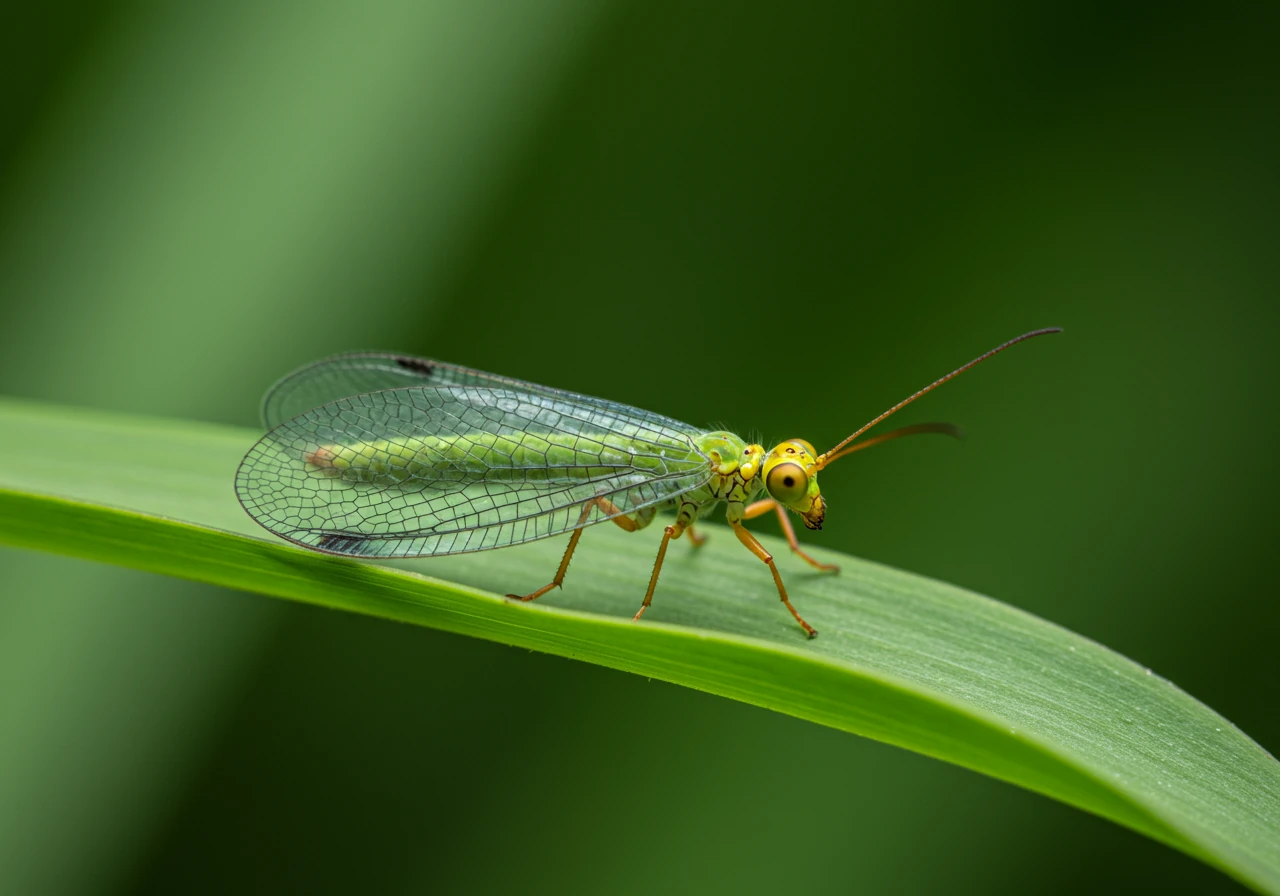
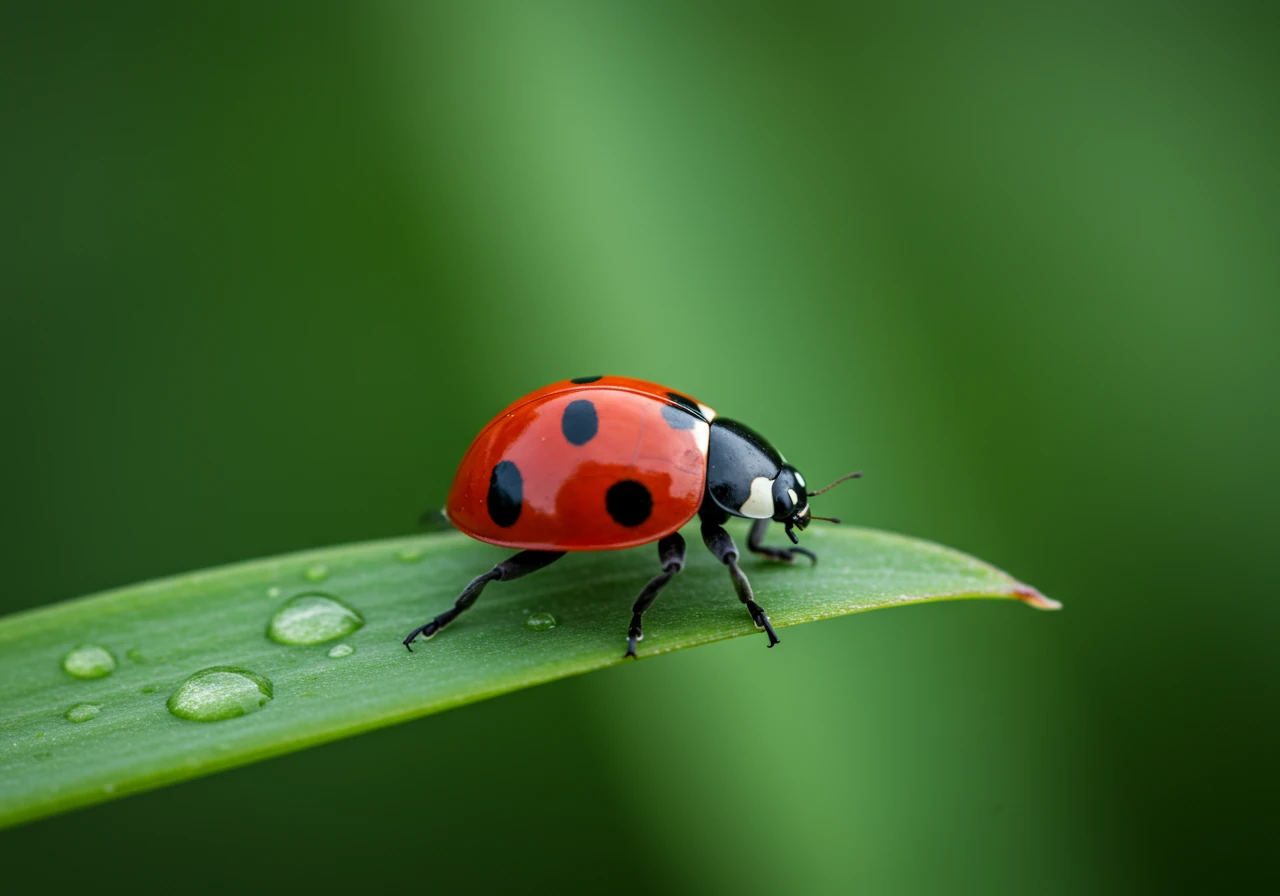
Let's meet some key members of the team you might find buzzing or crawling around your yard, whether you're in Barrhaven, Manotick, or anywhere else in the Ottawa region:
- The Aphid Annihilator: Ladybug (Lady Beetle)
- Look For: Everyone recognizes the adult! Small, dome-shaped, usually red or orange with black spots. But don't overlook their larvae – they look like tiny, spiky black and orange alligators, and they eat *way* more aphids than the adults!
- Superpower: Voracious appetite for aphids! They also snack on mites, scale insects, and insect eggs.
- Attract Them: Plant dill, fennel, cilantro, or yarrow. Avoid pesticides that harm them.
- The Green Guardian: Lacewing
- Look For: Adults are delicate, light green insects with beautiful, lacy wings and golden eyes, often seen fluttering around lights at night. The *real* heroes are the larvae, often called "aphid lions." They look like little brown crocodiles with fearsome pincers.
- Superpower: Aphid lions devour aphids, thrips, small caterpillars, and insect eggs like nobody's business.
- Attract Them: Plant flowers like cosmos, sweet alyssum, and coreopsis. They also appreciate a nearby water source (like a bird bath with some pebbles).
- The Night Prowler: Ground Beetle
- Look For: Usually large (1-3 cm), dark, shiny beetles that scurry quickly across the ground, often hiding under rocks, logs, or mulch during the day.
- Superpower: These nocturnal hunters patrol your soil surface, feasting on slugs, snails, caterpillars, ants, and even those pesky lawn grubs. Keeping your lawn healthy, maybe even through proper sod installation on well-prepared soil, can reduce grub populations they feed on.
- Attract Them: Provide shelter! Leave some leaf litter in garden beds (but not excessive debris that harbors pests – finding the balance is key). Mulch is also great. A thorough fall property clean up should aim to remove diseased material while leaving some natural cover.
- The Bee Impersonator: Hoverfly (Syrphid Fly)
- Look For: Adults cleverly mimic bees or wasps with yellow and black stripes, but they only have one pair of wings (bees have two) and tend to hover like tiny helicopters. The larvae are the unsung heroes – small, legless, maggot-like critters (often green or tan) found right amongst aphid colonies.
- Superpower: Hoverfly larvae are aphid-eating machines! One larva can consume hundreds of aphids before pupating.
- Attract Them: Adults feed on nectar and pollen. Plant small-flowered plants like alyssum, dill, parsley, and Queen Anne's lace.
Encouraging these beneficial insects is a core part of sustainable gardening. Planting a variety of native flowers and herbs provides them food and shelter. Avoiding broad-spectrum pesticides is crucial, as these sprays wipe out the good bugs along with the bad. Maintaining a healthy garden environment often involves regular care; sometimes getting help from a professional city garden maintenance service can make establishing these beneficial habitats easier. Remember, a slightly "wild" edge or incorporating diverse plantings can be very inviting for your Garden Avengers. While a tidy yard is good, performing an expert Manotick yard cleanup service or utilizing our Ottawa property cleanup service focuses on removing problem debris, not sterilizing the landscape entirely. It’s about balance. We believe in working *with* nature, which is why promoting beneficial insects is part of our philosophy – you can learn more about us and our approach here. So next time you see one of these critters, give them a little nod – they're on your side!
Common Pest Damage
Pests like aphids cause yellowing leaves and sticky honeydew. Grubs create dead patches in lawns by eating roots. Slugs chew unsightly holes in leafy greens. Understanding the damage helps identify the culprit.

Beneficial Insect Actions
Ladybugs and their larvae devour hundreds of aphids. Lacewing larvae ("aphid lions") are voracious predators of many soft-bodied pests. Ground beetles patrol at night, consuming slugs and harmful larvae. Attracting them provides continuous, natural pest control.

Benefits of Natural Control
Using beneficial insects avoids harmful chemical residues on plants and in soil. It protects pollinators like bees and butterflies. It creates a self-sustaining, balanced ecosystem in your garden, reducing the need for constant intervention. It's safer for pets, children, and the local environment. Check our Google Reviews to see how clients appreciate our eco-friendly approach!
Roll Out the Welcome Mat: Creating a Beneficial Bug Oasis in Your Yard
Okay, Manotick and Ottawa neighbours (looking at you too, Nepean and Richmond!), you've met the good guys – your garden's own pest patrol. Now, how do you actually get them to stick around? It's not about sending tiny engraved invitations (though that would be adorable). It's about creating a five-star resort for beneficial insects right in your own yard. Think of it as landscaping with benefits… insect benefits! Let's roll out the welcome mat and build a bug oasis.
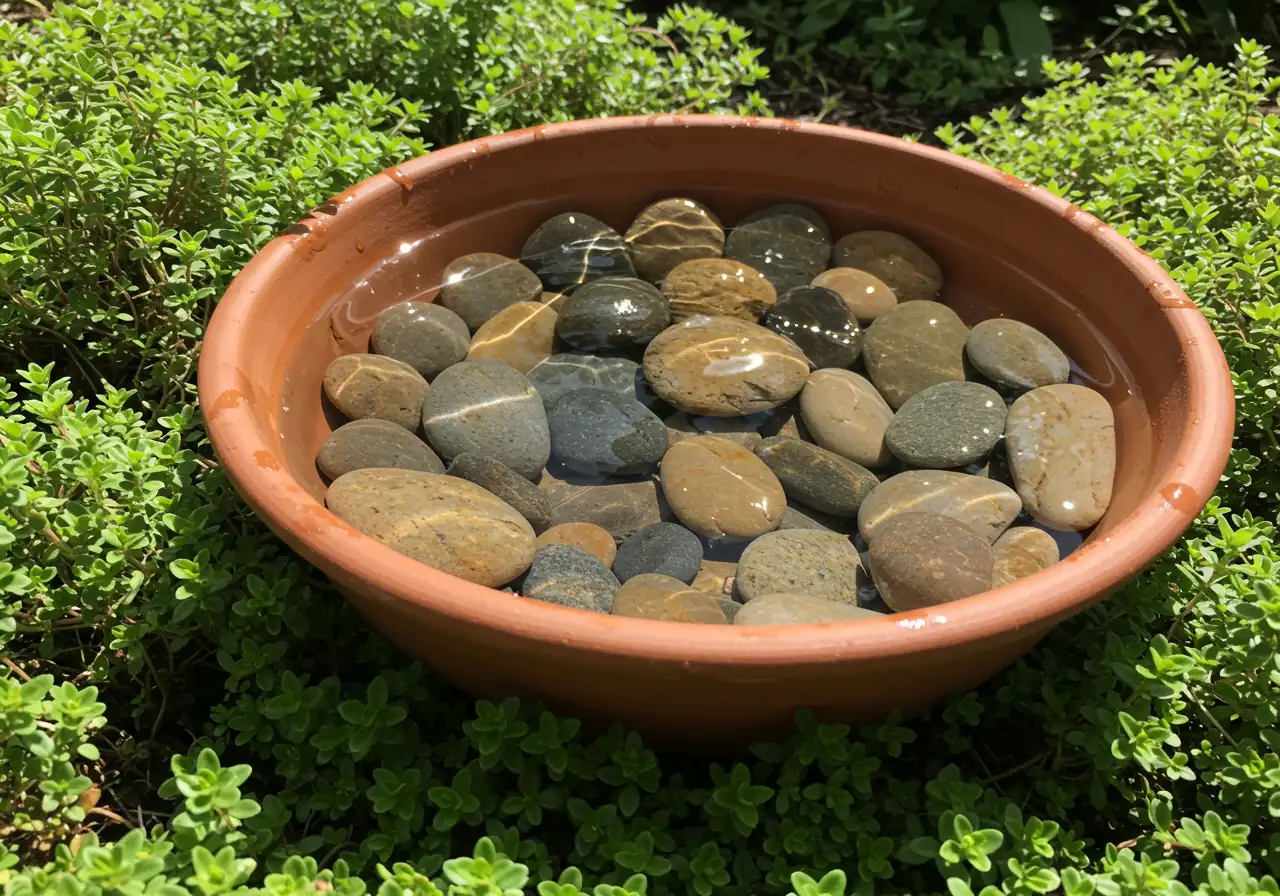
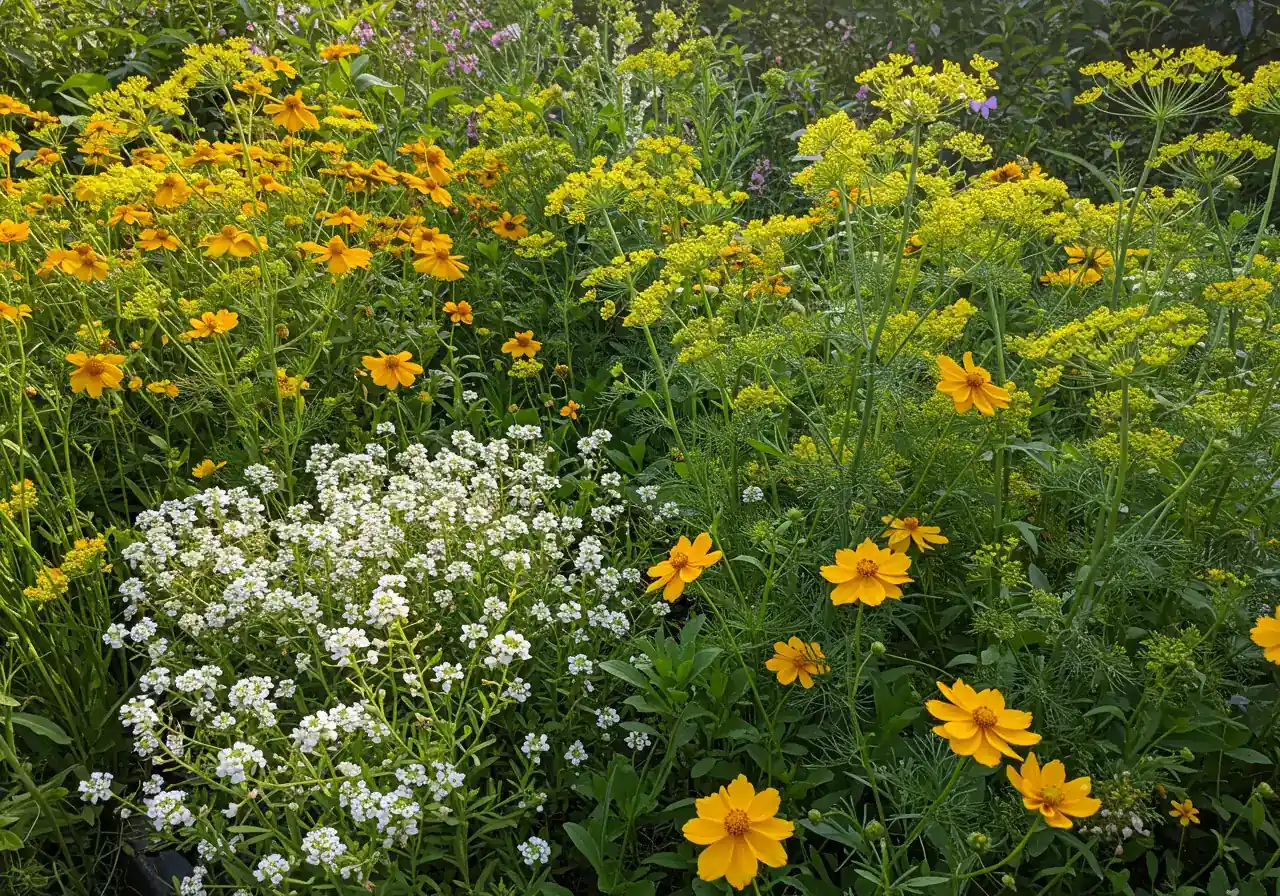
Feed Your Tiny Troops
Beneficial bugs, like us, need food! While many feast on pests (yay!), the adults often need pollen and nectar to thrive and reproduce. Planting a variety of flowers, especially native ones found via resources like the Fletcher Wildlife Garden (Ottawa Field-Naturalists' Club), is like setting out a buffet.
What to Plant: Think small flowers with easy-to-reach nectar. In our Ottawa climate (Zone 5a/b), consider these winners:
- Herbs: Dill, fennel, cilantro, parsley (let some flower!)
- Flowers: Sweet alyssum (a groundcover powerhouse), cosmos, coreopsis, sunflowers, yarrow, goldenrod (great native choice!)
- Veggie Patch Pals: Let some carrots or parsnips go to flower – beneficials love 'em!
Why it Works: Different insects have different tastes and mouthparts. A mix of flower shapes and sizes, blooming throughout the gardening season, ensures there's always something on the menu.
Watering Holes for Wee Ones
Even tiny heroes get thirsty! A deep bird bath is great for birds, but insects can easily drown. Offer them a safe place to sip.
Simple Sips:
- Place a shallow dish filled with pebbles or marbles and add water just up to the level of the stones. Insects can land safely on the pebbles to drink.
- If you have a bird bath, add a few larger stones that stick out of the water to create landing pads. Local resources like the Rideau Valley Conservation Authority often have tips on water-wise gardening which complements attracting insects.
Sweet Suites: Shelter and Overwintering
Your beneficial buddies need places to hide from predators, bad weather, and, crucially, to survive our chilly Ottawa winters.
Provide Cover:
- Leaf it Be (A Little): While a massive pile of soggy leaves can harbor pests and diseases, leaving *some* leaf litter or plant debris around the base of perennials or in designated corners provides crucial overwintering habitat. If things get out of hand, a targeted Metcalf garden clean up service can help manage debris smartly. Similarly, managing larger areas might benefit from a city property cleanup service that understands the balance needed.
- Stand Tall: Don't rush to cut back *all* your perennial stems and seed heads in the fall. Many insects shelter inside hollow stems or amongst the dried foliage. A selective approach during your fall routine, perhaps aided by a city garden clean up service, is best.
- Bug Hotels (Optional but Fun!): Bundles of hollow reeds, drilled blocks of wood, or designated rock piles offer cozy nooks.
- Plant Dense: Tightly spaced plantings offer natural shelter.
Build a Mini Insectary Patch
Want to create a dedicated beneficial bug hotspot? Try an 'insectary patch'!
- Pick a Spot: Choose a sunny location, maybe a corner of the yard or near your veggie garden.
- Prep the Ground: Clear the area of grass or weeds. If you're removing old turf, consider professional help for tasks like new lawn sod installation elsewhere once the area is prepped using proper soil preparation techniques.
- Plant Power: Fill the patch with a mix of the beneficial-attracting plants mentioned above (dill, alyssum, coreopsis, etc.). Variety is key!
- Add Amenities: Include your shallow water dish and maybe a small log or a few flat rocks for basking and hiding.
- Go Chemical-Free: This is *crucial*. Pesticides will wipe out your hard work and your helpful guests. Embrace the natural balance!
Creating a beneficial bug oasis is all about working *with* nature, not against it. It reduces the need for chemical interventions and supports a healthier, more vibrant garden ecosystem. It's a core part of sustainable gardening and aligns with eco-friendly practices. Our commitment to these principles is woven into how we operate; you can even see our general approach outlined in our service terms and conditions. Need a hand getting started or have more questions about creating your bug haven? Don't hesitate to contact us – we're happy to help!
Estimated Pest Reduction with Beneficial Insects
*Illustrative data showing potential impact. Results vary based on conditions and specific pests.
Beyond the Bugs: An Eco-Friendly IPM Strategy for Manotick Landscapes
So, we've talked about unleashing the "good bugs" – your garden's personal security force! But relying *only* on beneficial insects is like trying to build a house with just a hammer. You need a whole toolbox! That's where Integrated Pest Management, or IPM, comes in. Think of it as a smart, layered approach to pest control for your beautiful Manotick landscaping. It's about using common sense and starting with the gentlest solutions first, only bringing out bigger guns if absolutely necessary (and even then, aiming carefully!). IPM helps keep your garden healthy while being kind to the environment – something we value across Ottawa.
Instead of just reacting to pests, IPM focuses on prevention and uses multiple tactics. Beneficial insects are a fantastic *biological control*, but they're just one piece of the puzzle. Here are other tools in the IPM kit:
- Cultural Controls: This is all about smart gardening habits!
- Right Plant, Right Place: Choosing plants suited to our Ottawa climate and your specific yard conditions makes them naturally stronger and less prone to pests. Our team can help guide you with smart material selection for hardier landscapes.
- Good Housekeeping: Regular weeding, proper watering, and appropriate fertilizing are key. Consistent garden maintenance keeps plants healthy and less tempting to pests.
- Sanitation: Removing diseased plants promptly and cleaning up fallen fruit or debris eliminates hiding spots and food sources for pests. This is where seasonal cleanups are vital, like those offered by Ottawa yard cleanup service.
- Physical & Mechanical Controls: Sometimes, you gotta get hands-on!
- Hand-Picking: Yep, simply picking off larger pests like Japanese beetles or slugs (early morning is prime slug-spotting time!) and dropping them into soapy water can be surprisingly effective for small infestations.
- Barriers: Using row covers over vulnerable veggies can keep flying insects away. Copper tape around pots can deter slugs.
- Water Blasts: A strong spray of water can knock aphids or spider mites off plants.
- More Biological Controls: Besides insects, other living organisms can help.
- Nematodes for Grubs: If lawn grubs are turning your turf spongy (a common woe in Nepean and Barrhaven lawns!), beneficial nematodes can be a great solution. These microscopic roundworms hunt down grubs in the soil. Apply them typically in late summer/early fall when grubs are active near the surface. Consider this as part of your comprehensive lawn care plan.
Seasonal IPM Timeline for Ottawa Gardens
Spring (April-May)
Inspect dormant plants for scale insects or egg masses. Remove winter debris carefully, leaving some shelter. Start weed control early. Consider a professional spring tidy-up; a thorough city garden clean up service removes debris where pests hide. Communities like Marionville can benefit from garden clean up services too.
Early Summer (June-July)
Monitor actively growing plants weekly for aphids, beetles, etc. Use hand-picking or water sprays for initial control. Ensure proper watering during dry spells. Plant beneficial-attracting flowers. Check Ottawa property cleanup service for mid-season tidying if needed.
Late Summer (August-September)
Apply beneficial nematodes for grub control if diagnosed. Continue monitoring pests. Watch for signs of fungal diseases exacerbated by pests. Prepare for fall by assessing cleanup needs, perhaps consulting a Metcalf property cleanup service.
Fall (October-November)
Perform major cleanup: remove annuals, cut back diseased perennials selectively (leave some stems for insects). Rake leaves from lawn to prevent disease and pest overwintering. A comprehensive city yard cleanup service or a Metcalf yard cleanup service can be efficient.
Winter (December-March)
Plan next year's garden: choose resistant varieties, plan crop rotation. Clean and sharpen tools. Browse resources like material selection guides. Review your garden's success and adjust your IPM plan for next season. Our privacy policy outlines how we handle planning data.
IPM is about being an observant, proactive gardener. It takes a little more thought than just spraying, but the result is a healthier, more resilient landscape that buzzes with life – the good kind! If you enlist professional help, know that reputable services value your trust; for instance, you can see how we handle information in our privacy policy. Embracing IPM means fewer pests, less reliance on harsh chemicals, and a greener Manotick for everyone.
Quick Tips for a Bug-Friendly Backyard
Want to invite the good bugs to your Ottawa yard, whether you're in Manotick or Nepean? It's easier than you think! Here are a few simple landscaping tricks:
- Plant Power: Add small flowers like sweet alyssum, dill, or cilantro. Consider adding these pollinator magnets during your next garden installation project. Good bugs love the easy-access nectar!
- Water Station: Offer a safe sip! Place a shallow dish with pebbles and water, so tiny critters can drink without taking an accidental swim.
- Shelter Skelter: Leave *some* plant stems and a bit of leaf litter over winter for cozy hideouts. If garden beds get unruly, a targeted Ottawa garden clean up service can help tidy up without evicting *all* your helpful guests.
- Tidy, Not Sterile: For larger seasonal tasks like major leaf removal across your property, using an expert Ottawa yard cleanup service or a professional city yard cleanup service helps manage debris smartly. Avoiding harsh chemicals and leaving *some* natural elements means your garden ecosystem will thrive, and your beneficial bugs will silently thank you!
Your Ottawa Garden Questions Answered: Beneficial Insects FAQ
Not at all! Many of Ottawa’s beneficial insects are pros at surviving winter. They often hide as eggs, larvae, or adults in sheltered spots like under leaf litter, inside hollow plant stems, or beneath loose bark. That's why overly aggressive fall cleanups can remove their shelters! A careful approach, like the detail provided by a Marionville property cleanup service, aims to be tidy while respecting these natural hiding spots.
You sometimes can buy insects like ladybugs or lacewings from local garden centres or online, and they can give your garden a boost. However, it’s usually much better (and cheaper!) in the long run to attract local beneficials by creating the right habitat with food (flowers!), water, and shelter. Think of it as building a permanent home versus just having temporary visitors for your gardening efforts.
Good question! Generally, applying a moderate layer of organic mulch is actually *great* for ground beetles and other soil-dwellers. It provides cover from predators and helps keep the soil moist. Just avoid piling it excessively thick (more than 3-4 inches). Following proper mulching and edging techniques enhances your garden beds aesthetically and provides valuable habitat for these helpful critters.
For many common pests like aphids, yes! Attracting a diverse range of beneficial insects creates a natural balance. While it might not eliminate *every single* aphid (a few might stick around as food!), they can keep pest populations low enough that they don't cause serious damage. It’s amazing to see these tiny helpers contribute to beautiful garden transformations featuring healthy ecosystems. Patience and providing habitat are key!
It can feel like a bit much at first, but start small! Adding just a few key plants can make a difference. If you're feeling overwhelmed or want a bigger impact, professional landscaping services can help design and maintain bug-friendly spaces. Whether it's a targeted cleanup, like a Marionville yard cleanup service, or broader garden planning, getting expert advice tailored to your Ottawa property is a great option. We even welcome your feedback on landscaping estimates to ensure we're meeting your needs.
Conclusion: A Healthier Manotick Garden Starts with Nature's Helpers
So there you have it! Who knew that becoming a bug landlord could be the secret weapon for your beautiful Manotick garden? Instead of reaching for harsh sprays at the first sign of trouble, you can roll out the welcome mat for nature's own tiny pest control team. Ladybugs aren't just cute; they're aphid-eating machines! Ground beetles work the night shift against slugs. Creating a welcoming habitat for these beneficial insects means less hassle for you and a healthier paradise for your plants. Your gardening becomes more enjoyable, and you contribute to a greener Ottawa, whether you're here in Manotick, over in Greely, or down in Barrhaven.
Embracing these natural allies is a cornerstone of smart, sustainable landscaping. It reduces reliance on chemicals, protects pollinators, and builds a more resilient ecosystem right in your backyard. Think of it as letting nature do some of the heavy lifting – they work cheap, asking only for a few flowers and a safe place to hang out!
Ready to transform your yard into a thriving, bug-friendly oasis? If you'd like a hand implementing these eco-friendly practices with expert lawn care or seasonal garden maintenance, we're here to assist. Our property cleanup and garden care services across the Ottawa area are designed to support a balanced, healthy landscape that welcomes nature's helpers.
Contact Clean Yards for Eco-Friendly SolutionsServing Manotick, Greely, Osgoode, Barrhaven, Nepean, Metcalf, Marionville, and the wider Ottawa region.

